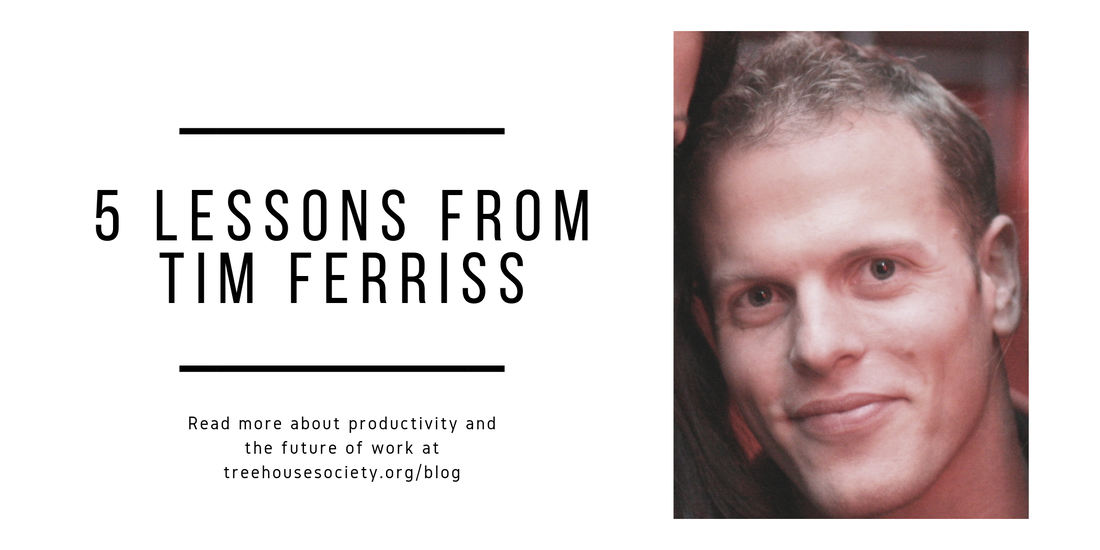|
by Catherine Choy Tim Ferris is an entrepreneur, author of several knowledgeable books, and often the #1 business podcaster on all of Apple Podcasts. He frequently shares his insight and knowledge through all of his work. Here are five important lessons we can learn from Tim Ferriss:
Self-improvement is much more than achieving goals. Of course, when one thinks of self-improvement, one thinks of setting goals and accomplishing them. However, Tim claims that it is only 50% of what self-improvement is. The other half is showing gratitude and focus on appreciating what you already have, not completely on future goals. Tim emphasizes the importance of not becoming one of those people who have accomplished and earned so much, yet is still unsatisfied. If you are not happy, what is the point? This means that constantly reminding yourself of what you should be thankful for is just as important as accomplishing future goals. Use incentives to keep you motivated. Often, we may lose motivation when working towards a goal that may take a long time. Some examples of these goals may be to write a book, lose 30 pounds, or save enough money to travel the world. The internal fire to accomplish these goals may be there in the beginning but then it starts to decline as time goes on. Tim says he lacks intrinsic motivation which means that he is not naturally motivated. If you find yourself relating to this, this means that you may work harder when there is a reward or punishment involved. If that is the case, Tim recommends that you set strict deadlines for yourself that are impossible to push back. This way, you are more motivated to work closer to your goal to avoid punishment. Another option is to reward yourself if you meet your deadline. In all, using external rewards and incentives is a great way to keep yourself accountable and motivated. Continue developing your skills and relationships. This may seem like a no-brainer as to why it should be important in your life. However, Tim relates explains how developing skills and relationships can positively change your perspective on failure. Tim essentially believes, "Failure isn't a failure if you can gain new skills and develop relationships for future advancement." This means the next time you evaluate a time you “failed”, make sure to ask yourself, “Were there any skills and relationships that I have developed and can help me in the future?”. If the answer is yes, then do not consider it a failure. You do not need to be relevant all the time. Take a week, month, or even year off for you to do some deep thinking, cleansing, or whatever it is you need to do before returning to the world. Remind yourself that it is perfectly fine to do this. Tim believes you do not need to be everywhere all at once if you are simply just good at what you do. It is important to diversify yourself from everyone else and to take some time for yourself to fully know who you are and what you want. Your drive will be the thing to set you apart. Often we relate success to intelligence. However, intelligence is essentially the minimum qualification it takes to become successful. Many people are intelligent but it is the drive and energy that will set you apart from the others. Tim was willing to use all of his energy and effort required to become successful. This effort and energy are what set Tim apart and essentially led him to his success. Tim Ferriss is ultimately a productivity superstar and ultimately great at not only achieving his goals but also helping others at achieving their goals. His bestselling books include 4-Hour Work Week, Tribe of Mentors: Short Life Advice from the Best in the World, and Tools of Titans: The Tactics, Routines, and Habits of Billionaires, Icons, and World-Class Performers. Also, check out his podcast! You will be inspired. https://www.businessinsider.com/10-lessons-from-tim-ferriss-that-took-him-a-decade-to-learn-2017-5 https://hbr.org/2011/03/power-comes-to-those-willing-t
0 Comments
Leave a Reply. |
Categories
All
|




